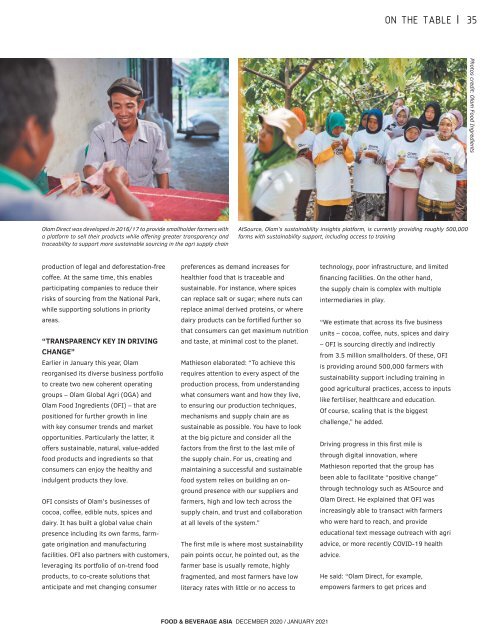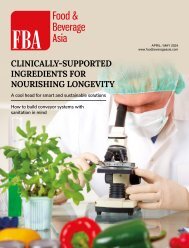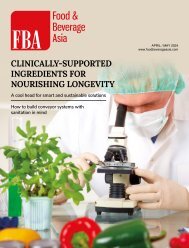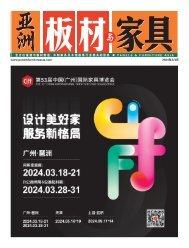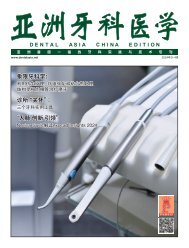Food & Beverage Asia December 2020/January 2021
Food & Beverage Asia (FBA) is the leading source of food and beverage news in Asia since 2002. FBA delivers a comprehensive view of the food and beverage landscape, spanning across the latest health and nutrition trends and industry innovations in ingredients, recipe formulations, food science, sustainability, packaging, and automation, as well as advancements in agri and food-tech.
Food & Beverage Asia (FBA) is the leading source of food and beverage news in Asia since 2002. FBA delivers a comprehensive view of the food and beverage landscape, spanning across the latest health and nutrition trends and industry innovations in ingredients, recipe formulations, food science, sustainability, packaging, and automation, as well as advancements in agri and food-tech.
- No tags were found...
You also want an ePaper? Increase the reach of your titles
YUMPU automatically turns print PDFs into web optimized ePapers that Google loves.
ON THE TABLE 35<br />
Photos credit: Olam <strong>Food</strong> Ingredients<br />
Olam Direct was developed in 2016/17 to provide smallholder farmers with<br />
a platform to sell their products while offering greater transparency and<br />
traceability to support more sustainable sourcing in the agri supply chain<br />
AtSource, Olam’s sustainability insights platform, is currently providing roughly 500,000<br />
farms with sustainability support, including access to training<br />
production of legal and deforestation-free<br />
coffee. At the same time, this enables<br />
participating companies to reduce their<br />
risks of sourcing from the National Park,<br />
while supporting solutions in priority<br />
areas.<br />
“TRANSPARENCY KEY IN DRIVING<br />
CHANGE”<br />
Earlier in <strong>January</strong> this year, Olam<br />
reorganised its diverse business portfolio<br />
to create two new coherent operating<br />
groups – Olam Global Agri (OGA) and<br />
Olam <strong>Food</strong> Ingredients (OFI) – that are<br />
positioned for further growth in line<br />
with key consumer trends and market<br />
opportunities. Particularly the latter, it<br />
offers sustainable, natural, value-added<br />
food products and ingredients so that<br />
consumers can enjoy the healthy and<br />
indulgent products they love.<br />
OFI consists of Olam’s businesses of<br />
cocoa, coffee, edible nuts, spices and<br />
dairy. It has built a global value chain<br />
presence including its own farms, farmgate<br />
origination and manufacturing<br />
facilities. OFI also partners with customers,<br />
leveraging its portfolio of on-trend food<br />
products, to co-create solutions that<br />
anticipate and met changing consumer<br />
preferences as demand increases for<br />
healthier food that is traceable and<br />
sustainable. For instance, where spices<br />
can replace salt or sugar; where nuts can<br />
replace animal derived proteins, or where<br />
dairy products can be fortified further so<br />
that consumers can get maximum nutrition<br />
and taste, at minimal cost to the planet.<br />
Mathieson elaborated: “To achieve this<br />
requires attention to every aspect of the<br />
production process, from understanding<br />
what consumers want and how they live,<br />
to ensuring our production techniques,<br />
mechanisms and supply chain are as<br />
sustainable as possible. You have to look<br />
at the big picture and consider all the<br />
factors from the first to the last mile of<br />
the supply chain. For us, creating and<br />
maintaining a successful and sustainable<br />
food system relies on building an onground<br />
presence with our suppliers and<br />
farmers, high and low tech across the<br />
supply chain, and trust and collaboration<br />
at all levels of the system.”<br />
The first mile is where most sustainability<br />
pain points occur, he pointed out, as the<br />
farmer base is usually remote, highly<br />
fragmented, and most farmers have low<br />
literacy rates with little or no access to<br />
technology, poor infrastructure, and limited<br />
financing facilities. On the other hand,<br />
the supply chain is complex with multiple<br />
intermediaries in play.<br />
“We estimate that across its five business<br />
units – cocoa, coffee, nuts, spices and dairy<br />
– OFI is sourcing directly and indirectly<br />
from 3.5 million smallholders. Of these, OFI<br />
is providing around 500,000 farmers with<br />
sustainability support including training in<br />
good agricultural practices, access to inputs<br />
like fertiliser, healthcare and education.<br />
Of course, scaling that is the biggest<br />
challenge,” he added.<br />
Driving progress in this first mile is<br />
through digital innovation, where<br />
Mathieson reported that the group has<br />
been able to facilitate “positive change”<br />
through technology such as AtSource and<br />
Olam Direct. He explained that OFI was<br />
increasingly able to transact with farmers<br />
who were hard to reach, and provide<br />
educational text message outreach with agri<br />
advice, or more recently COVID-19 health<br />
advice.<br />
He said: “Olam Direct, for example,<br />
empowers farmers to get prices and<br />
FOOD & BEVERAGE ASIA DECEMBER <strong>2020</strong> / JANUARY <strong>2021</strong>


